188 start with I start with I
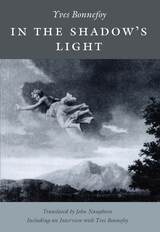
"Included here is a very helpful and touchingly personal interview with the poet. . . . For readers with no prior knowledge of Bonnefoy's work, this volume would be an excellent place to start."—Stephen Romer, Times Literary Supplement
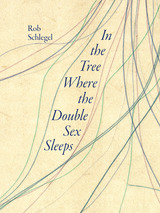
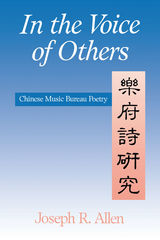
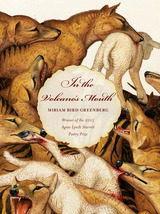
Winner of the 2017 Bob Bush Memorial Award for Best First Book of Poetry from the Texas Institute of Letters
Miriam Bird Greenberg’s stunning first collection, which roves across a lush, haunting rural America both real and imagined, observed from railyards and roadsides, evokes the world of myth (“I’d spent my childhood / in a house made of bees; on hot days honey // dripped through cracks in the ceiling,” she writes). Yet these capacious, exquisitely tensioned poems are rooted in Greenberg’s experiences hitchhiking and hopping freight trains across North America, or draw from her informal interviews with contemporary nomads, hobos, and others living on society’s edges. Beneath their surface runs a current of violence, whether at the hands of fate or men: she writes “Everyone knows // what happens to women // who hitchhike, constantly // trying a door to the other world made of lake / bottom or low forest, abandoned house // even wild animals / have rejected.” The result is a queering of On the Road, a feminist Frank Stanford at once vulnerable and canny. Richly textured, In the Volcano’s Mouth is an extraordinary portrait of life on the enchanted margins.
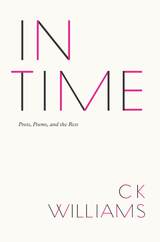
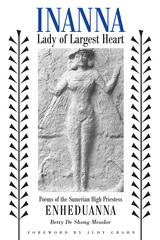
The earliest known author of written literature was a woman named Enheduanna, who lived in ancient Mesopotamia around 2300 BCE. High Priestess to the moon god Nanna, Enheduanna came to venerate the goddess Inanna above all gods in the Sumerian pantheon. The hymns she wrote to Inanna constitute the earliest written portrayal of an ancient goddess. In their celebration of Enheduanna's relationship with Inanna, they also represent the first existing account of an individual's consciousness of her inner life.
This book provides the complete texts of Enheduanna's hymns to Inanna, skillfully and beautifully rendered by Betty De Shong Meador, who also discusses how the poems reflect Enheduanna's own spiritual and psychological liberation from being an obedient daughter in the shadow of her ruler father. Meador frames the poems with background information on the religious and cultural systems of ancient Mesopotamia and the known facts of Enheduanna's life. With this information, she explores the role of Inanna as the archetypal feminine, the first goddess who encompasses both the celestial and the earthly and shows forth the full scope of women's potential.
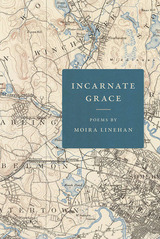
In her collection Incarnate Grace, poet Moira Linehan explores, questions, and ultimately celebrates her attempt to live in the temple of the present.
After learning she has breast cancer, the poet struggles to live an examined life. Alienated and estranged from her own body, she turns her cancer into “these binoculars, / this new way of looking,” and uses it as a way of fixing herself firmly within the moment. As she travels Ireland and the Pacific Northwest, her busy mind moves from the knot in her breast to the knots in her knitting to the illuminated knots of The Book of Kells to the tossing, knotted surface of the sea; from the margins of her surgery—clean but not ideal—to the margins of illuminated manuscripts. She links the mundane to the mythic, intertwining connections between scripture and nature, storms and loss, winter and light, breast cancer and embroidery. As she returns to her home on a small pond in Massachusetts, she takes with her the fruits of her travels: the incarnate grace of the ordinary.
Vivid and compelling, Incarnate Grace finds beauty in the worst of circumstances and redemption in the fabric of daily life.
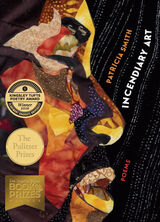
Winner, 2017 Los Angeles Times Book Prize
Finalist, 2018 Pulitzer Prize for Poetry
Winner, NAACP Image Award for Outstanding Literary Work in the Poetry category
Winner, 2018 Kingsley Tufts Poetry Award
Winner, 2018 BCALA Best Poetry Award
Winner, Abel Meeropol Award for Social Justice
Finalist, Neustadt International Prize for Literature
Winner, 2021 Ruth Lilly Poetry Prize
One of the most magnetic and esteemed poets in today’s literary landscape, Patricia Smith fearlessly confronts the tyranny against the black male body and the tenacious grief of mothers in her compelling new collection, Incendiary Art. She writes an exhaustive lament for mothers of the "dark magicians," and revisits the devastating murder of Emmett Till. These dynamic sequences serve as a backdrop for present-day racial calamities and calls for resistance. Smith embraces elaborate and eloquent language— "her gorgeous fallen son a horrid hidden / rot. Her tiny hand starts crushing roses—one by one / by one she wrecks the casket’s spray. It’s how she / mourns—a mother, still, despite the roar of thorns"— as she sharpens her unerring focus on incidents of national mayhem and mourning. Smith envisions, reenvisions, and ultimately reinvents the role of witness with an incendiary fusion of forms, including prose poems, ghazals, sestinas, and sonnets. With poems impossible to turn away from, one of America’s most electrifying writers reveals what is frightening, and what is revelatory, about history.
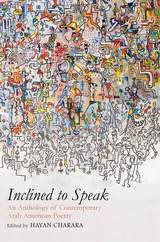
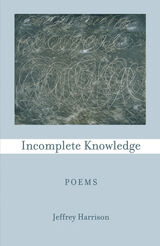
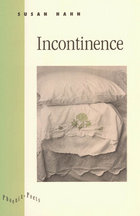
"Stitching together tropes about writing and technique, as well as hunting and the loss of sexual innocence, [Hahn] marks and exploits the body with surgical precision in order to explore the peripheries of the personal lyric. She wants to take poetry to the most tangible and sensual extremes. It's often uncomfortable, and yet as often results in a poetry of generous, piercing honesty, as if (to rewrite Bradford) it's by the body we are 'plainly told.'"—David Baker, Poetry
"Incontinence has an enormous, almost epic sweep."—Chicago Sun-Times
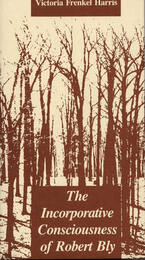
Victoria Frenkel Harris traces the aesthetic journey of poet Robert Bly from his early structured works of mystical imagery and lyrical landscapes to his recent explorations of intimate relationships and male socialization.
Examining the various ways Bly’s prose poems articulate his opposition to the Vietnam War and his recent writings manipulate more formal patterns in detailing the intricacies of human relationships, Harris labels this evolution in form, subject, and imagery the incorporative consciousness, incorporative because it assimilates Jungian psychological categories, international poetic traditions, and a compelling breadth of topics.
Harris relies in part on contemporary feminist theory to throw revealing new light on Bly’s recent works. Though sympathetic to Bly, Harris finds that—in spite of his affirmation of the interaction of psychic, creative, and intellectual energies in both sexes—the poet’s later, erotic poems tend to objectify women in counterproductive ways. Bly’s idealization of woman as a Jungian universal, Harris contends, can blind him toward actual women.
Harris is at her best as she delimits with balance and precision the full complexity of the poet’s work.
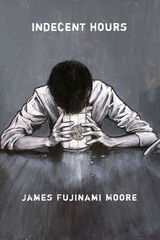
For award-winning poet James Fujinami Moore, the past is never past. In this brutal debut, sensual, political, and imagined worlds collide, tracing a history of diaspora and trauma that asks: what do we do in the aftermath of violence, and why do we long to inflict it? From Vegas boxing rings and the restless sands of Manzanar to the scrolling horrors of a Facebook feed, Moore’s poems trace over intimate details with surprising humor, fierce eroticism, and a restless eye.
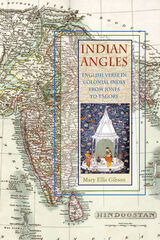
A 2012 CHOICE “Outstanding Academic Title“
A new historical approach to Indian English literature
Mary Ellis Gibson shows that poetry, not fiction, was the dominant literary genre of Indian writing in English until 1860 and that poetry written in colonial situations can tell us as much or even more about figuration, multilingual literacies, and histories of nationalism than novels can. Gibson re-creates the historical webs of affiliation and resistance that were experienced by writers in colonial India—writers of British, Indian, and mixed ethnicities.
Advancing new theoretical and historical paradigms for reading colonial literatures, Indian Angles makes accessible many writers heretofore neglected or virtually unknown. Gibson recovers texts by British women, by nonelite British men, and by persons who would, in the nineteenth century, have been called Eurasian. Her work traces the mutually constitutive history of English-language poets from Sir William Jones to Toru Dutt and Rabindranath Tagore. Drawing on contemporary postcolonial theory, her work also provides new ways of thinking about British internal colonialism as its results were exported to South Asia.
In lucid and accessible prose, Gibson presents a new theoretical approach to colonial and postcolonial literatures.

This study of the Thai chan meters contends that Thai linguistic constraints and poetic principles determined the transformation of the Pali meters and stanzas into their Thai counterparts. Disproving the frequent claims that the old chan compositions ignored the sequencing of the particular syllable types required by the meters, the author determines why the meters became popular only during certain eras and just what the aesthetic conditions were that nurtured the use of the meters.
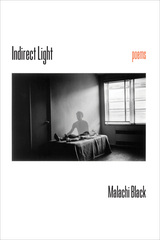
Reliving the overdoses of friends and loved ones, Malachi Black closes this book’s opening poem with a resuscitating command: “Doctor, / turn back. One of us lives.” Indirect Light is a testament to and apologia for this assertion of vitality, each eponymous poem an elegy dedicated to one of Black’s dearly departed. Though this book mourns an irretrievable past, it wages war against amnesia, refusing to let death erase the vibrancy of their lives. These poems preserve “the breath we left beside us on the train tracks,” “the watery inscriptions of nearby dogwood branches / dipped in shade,” “our bookbags’ mouths / pouting open on our laps,” “our street-scabbed bodies / briefly tinseled in the sun.”
Insofar as this collection returns to kin and friends to honor them by the indirect light of memory, it also seeks to memorialize the author's personal experience of adolescence and addiction amidst the opioid epidemic. It is a lament for all that's lost and a paean to the near misses and the just enough: a dim glow you can see by, a cup of coffee passed during NA, a prayer during detox to "be // as empty / as the sky" if floating means survival.
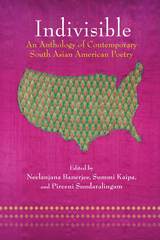


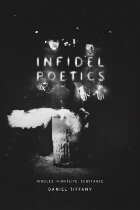
Poetry has long been regarded as the least accessible of literary genres. But how much does the obscurity that confounds readers of a poem differ from, say, the slang that seduces listeners of hip-hop? Infidel Poetics examines not only the shared incomprensibilities of poetry and slang, but poetry's genetic relation to the spectacle of underground culture.
Charting connections between vernacular poetry, lyric obscurity, and types of social relations—networks of darkened streets in preindustrial cities, the historical underworld of taverns and clubs, the subcultures of the avant-garde—Daniel Tiffany shows that obscurity in poetry has functioned for hundreds of years as a medium of alternative societies. For example, he discovers in the submerged tradition of canting poetry and its eccentric genres—thieves’ carols, drinking songs, beggars’ chants—a genealogy of modern nightlife, but also a visible underworld of social and verbal substance, a demimonde for sale.
Ranging from Anglo-Saxon riddles to Emily Dickinson, from the icy logos of Parmenides to the monadology of Leibniz, from Mother Goose to Mallarmé, Infidel Poetics offers an exhilarating account of the subversive power of obscurity in word, substance, and deed.
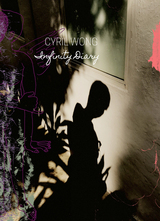
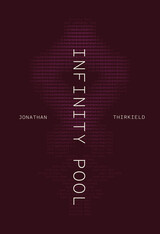
Diving through illusions and phantoms of virtual realms and into the human desire for boundless possibility, Infinity Pool charts the ways technologies have become embedded in our minds, bodies, and lives. Immersed in a world of data streams, neural nets, spider algorithms, and electronic terminals, Jonathan Thirkield’s poems plumb the dissonances and shrinking distances between ourselves and digital technologies, imagining what becomes of the fragile machinery of the human body amid a rapidly transforming world.
Thirkield turns to language as a mediator and explores infinity as a mathematical concept, a multiverse conceit, and a driver of the computational imagination. Traveling across the full spectrum of digital experience—from satellites crossing the edges of our solar system to microscopic bytes that operate beneath our perception—this collection is a testament to the future we imagine ourselves to be living through and to what happens when our escapist desires give way to the realities of birth, loss, parenthood, and sickness.
Through lyrical, narrative, and formal mutations, these poems cut through a decade of exponential technological growth, landing in the reality of our corporeal experiences: the isolation of chronic illness, the daunting journeys of children growing up today, and the hope that we can remain connected to each other no matter how tenuous the ties.
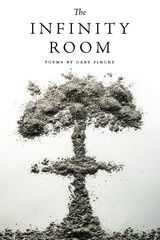
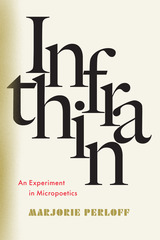
The “infrathin” was Marcel Duchamp’s playful name for the most minute shade of difference: that between the report of a gunshot and the appearance of the bullet hole, or between two objects in a series made from the same mold. “Eat” is not the same thing as “ate.” The poetic, Marjorie Perloff suggests, can best be understood as the language of infrathin. For in poetry, whether in verse or prose, words and phrases that are seemingly unrelated in ordinary discourse are realigned by means of sound, visual layout, etymology, grammar, and construction so as to “make it new.”
In her revisionist “micropoetics,” Perloff draws primarily on major modernist poets from Stein and Yeats to Beckett, suggesting that the usual emphasis on what this or that poem is “about,” does not do justice to its infrathin possibilities. From Goethe’s eight-line “Wanderer’s Night Song” to Eliot’s Four Quartets, to the minimalist lyric of Rae Armantrout, Infrathin is designed to challenge our current habits of reading and to answer the central question: what is it that makes poetry poetry?
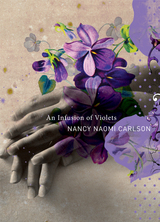
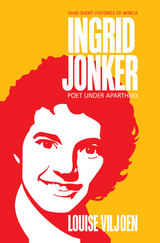
Nelson Mandela brought the poetry of Ingrid Jonker to the attention of South Africa and the wider world when he read her poem “Die kind” (The Child) at the opening of South Africa’s first democratic parliament on May 24, 1994. Though Jonker was already a significant figure in South African literary circles, Mandela’s reference contributed to a revival of interest in Jonker and her work that continues to this day.
Viljoen’s biography illuminates the brief and dramatic life of Jonker, who created a literary oeuvre—as searing in its intensity as it is brief—before taking her own life at the age of thirty-one. Jonker wrote against a background of escalating apartheid laws, violent repression of black political activists, and the banning of the African National Congress and the Pan Africanist Congress. Viljoen tells the story of Ingrid Jonker in the political and cultural context of her time, provides sensitive insights into her poetry, and considers the reasons for the enduring fascination with her life and death.
Her writings, her association with bohemian literary circles, and her identification with the oppressed brought her into conflict with her father, a politician in the white ruling party, and with other authority figures from her Afrikaner background. Her life and work demonstrate the difficulty and importance of artistic endeavor in a place of terrible conflict.
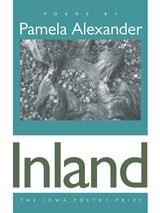
Despite this variety, Inland has an emerging organization that suggests a kind of plot. The family is left behind in the way that families of origin always are, revealed fully only in perspective: “foghorns / in the harbor, two different pitches / at different intervals / repeating so often I didn't hear them / and their accidental harmonies / until I'd left town.” Shifting toward the subject of new relationships, in her diatribe against a past (and passing) lover Alexander gives a new twist to the fact that this subject has been fair game for poets for centuries: “...you could say hello, you canoe-footed fur-faced / musk ox, pockets full of cheese and acorns / and live fish and four-headed winds and sky...”
James Merrill, praising Alexander's first book, called it “a wonderful achievement. Her language is now simple, now playful, now extremely poignant.” This is an apt description of Inland as well, a book that shows Alexander in witty yet serious engagement with the world. The longest poem here, “Swallowing the Anchor” (the title is the sailors' term for giving up the sea), is also the most directly personal. It closes the section of the book in which the poet comes to terms with losses, including the death of the loved one. She does this with grace—and her wit is not jokes, her poignancy is not sentimentality.
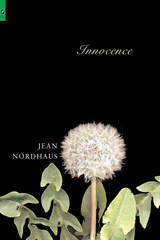

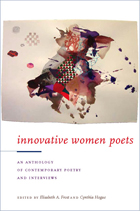
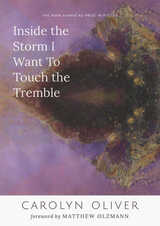
Oliver’s polyphonic gathering of speakers includes lovers and saints, painters and dead poets, a hawk and a mother. In varied forms (ghazals and prose poems, dialogues and erasures, bref double and Golden Shovel, among others) these poems bear witness to and seek reprieve from disasters at once commonplace and terrifying. “I can’t surface for every scalpel slice, / I need a dreamy estuary present,” she writes.
Stumbling toward joy across time and space, these poems hum with fear and desire, bewildering loss, and love’s lush possibilities.
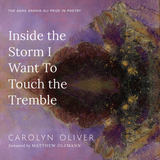
Oliver’s polyphonic gathering of speakers includes lovers and saints, painters and dead poets, a hawk and a mother. In varied forms (ghazals and prose poems, dialogues and erasures, bref double and Golden Shovel, among others) these poems bear witness to and seek reprieve from disasters at once commonplace and terrifying. “I can’t surface for every scalpel slice, / I need a dreamy estuary present,” she writes.
Stumbling toward joy across time and space, these poems hum with fear and desire, bewildering loss, and love’s lush possibilities.
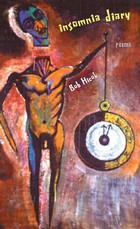
“The most potent ingredient in virtually every one of Bob Hicok’s compact, well-turned poems is a laughter as old as humanity itself, a sweet waggery that suggests there’s almost no problem that can’t be solved by this poet’s gentle humor.”
—New York Times Book Review
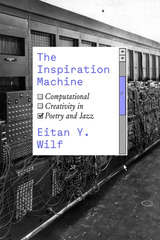
In The Inspiration Machine, Eitan Y. Wilf explores the transformative potentials that digital technology opens up for creative practice through three ethnographic cases, two with jazz musicians and one with a group of poets. At times dissatisfied with the limitations of human creativity, these artists do not turn to computerized algorithms merely to execute their preconceived ideas. Rather, they approach them as creative partners, delegating to them different degrees of agentive control and artistic decision-making in the hopes of finding inspiration in their output and thereby expanding their own creative horizons.
The algorithms these artists develop and use, however, remain rooted in and haunted by the specific social predicaments and human shortfalls that they were intended to overcome. Experiments in the digital thus hold an important lesson: although Wilf’s interlocutors returned from their adventures with computational creativity with modified, novel, and enriched capacities and predilections, they also gained a renewed appreciation for, and at times a desire to re-inhabit, non-digital creativity. In examining the potentials and pitfalls of seemingly autonomous digital technologies in the realm of art, Wilf shows that computational solutions to the real or imagined insufficiencies of human practice are best developed in relation to, rather than away from, the social and cultural contexts that gave rise to those insufficiencies, in the first place.
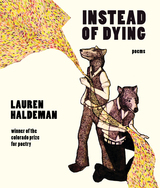
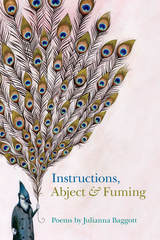
Alongside her cultural commentary, the speaker frankly confronts love and sex, as well as the beauty and brutality of having children. Still other poems reflect questions and considerations of faith: the speaker ponders St. Thomas in a pet store and imagines Jesus explaining to God how it feels to have a body.
Baggott’s use of obsolete Old English words subverts common language and creates new ways of interrogating the world around us. There is heartache on these pages, but Baggott also offers humor, such as a complaint about a lover’s eating habits or an extended discourse on a baby’s rattle. Baggott’s latest proves to be a rollicking book sui generis.
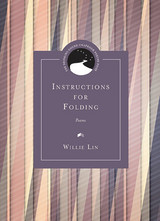
In one of the poems in Instructions for Folding, Willie Lin writes, “it seemed you were away but not beyond language.” And accordingly, the voice in these poems is sometimes fervid, sometimes wry, moved to speech by the specific desire to speak to someone. The poems often progress associatively, following a kind of lyric logic of involution, disruption, and juxtaposition. They rehearse the work of learning the heft and shape of memories. They revel in failures and take pleasure in mourning. They bristle with narrative suggestiveness, weaving an austere music against a scrim of love, loneliness, secrets, and elation.
.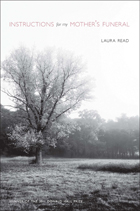
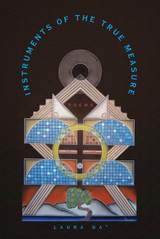
Surveying and geography underpin the collection, but even as Da’ investigates these signifiers of measurement, she pushes the reader to interrogate their function within the stark atrocities of American history. Da’ laments this harsh dichotomy, observing that America’s mathematical point of beginning is located in the heart of her tribe’s homeland: “I do not have the Shawnee words to describe this place; the notation that is available to me is 40°38´32.61´´ N 80°31´9.76´´ W.”
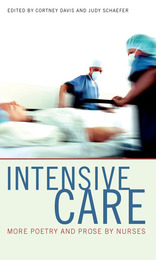
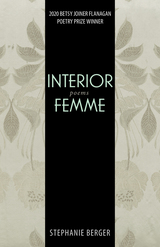
At the center of the book is Mnemosyne, goddess of memory and mother of the nine muses, who is crumbling under the terrific burden of remembering. In these poems, there is a woman critically wounded—representing the totality of the Western feminine imaginary—who is seeking answers to dire questions. Lyrically complex, sometimes surreal, and often ekphrastic in style and content, Interior Femme simultaneously offers heartbreak, laughter, comfort, and empowerment.
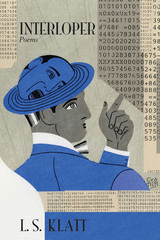
The poems in Interloper unsettle frontiers between disparate worlds so that the imagination is given room to roam: pears become guitars, racks of ribs are presented as steamboats, and helicopters transmute into diesel seraphs. The poetry aspires acrobatically in the manner of prayers and pilots, but adventure throughout the book is viewed as precarious and the will to conquest leads to apocalypse and ruin. The interloper wanders through crime scenes and crash sites as he glosses the landscape—at home and not at home with the America of yesterday and tomorrow. In symbols that scat and ricochet, the interloper scores a new song, one that composes—and decomposes—on the page.
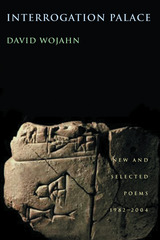
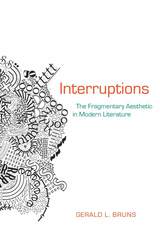
In Interruptions: The Fragmentary Aesthetic in Modern Literature, Gerald L. Bruns explores the effects of parataxis, or fragmentary writing as a device in modern literature. Bruns focuses on texts that refuse to follow the traditional logic of sequential narrative. He explores numerous examples of self-interrupting composition, starting with Friedrich Schlegel's inaugural theory and practice of the fragment as an assertion of the autonomy of words, and their freedom from rule-governed hierarchies.
Bruns opens the book with a short history of the fragment as a distinctive feature of literary modernism in works from Gertrude Stein to Paul Celan to present-day authors. The study progresses to the later work of Maurice Blanchot and Samuel Beckett, and argues, controversially, that Blanchot's writings on the fragment during the 1950s and early 1960s helped to inspire Beckett’s turn toward paratactic prose.
The study also extends to works of poetry, examining the radically paratactic arrangements of two contemporary British poets, J. H. Prynne and John Wilkinson, focusing chiefly on their most recent, and arguably most abstruse, works. Bruns also offers a close study of the poetry and poetics of Charles Bernstein.
Interruptions concludes with two chapters about James Joyce. First, Bruns tackles the language of Finnegans Wake, namely the break-up of words themselves, its reassembly into puns, neologisms, nonsense, and even random strings of letters. Second, Bruns highlights the experience of mirrors in Joyce’s fiction, particularly in Dubliners, Portrait of the Artist as a Young Man, and Ulysses, where mirrored reflections invariably serve as interruptions, discontinuities, or metaphorical displacements and proliferations of self-identity.
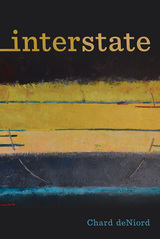

This is a book for those who were raised to be girls and expected to become women, for those who were told they were too girly and not girly enough, and for those who were ogled, talked over, touched, fed, imagined, and indoctrinated in ways they didn’t want. Angela Hume writes directly about the experience of womanhood, addressing the boundaries and pressures imposed from childhood on. She considers the persistent instructions to smile, be quiet, and act happy, all administered with the promise that this forced behavior would make everything better. The poems address rigid social norms and, ultimately, walk through the uncomfortable realizations about the bigger systems at play and call on us to examine our own complicity in them.
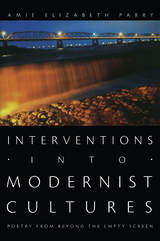
Reading various works by U.S. expatriates Ezra Pound and Gertrude Stein, Parry compares the cultural politics of U.S. canonical modernism with alternative representations of temporality, hybridity, erasure, and sexuality in the work of the Taiwanese writers Yü Kwang-chung and Hsia Yü and the Asian American immigrant author Theresa Hak Kyung Cha. Juxtaposing poems by Pound and Yü Kwang-chung, Parry shows how Yü’s fragmented, ambivalent modernist form reveals the effects of neocolonialism while Pound denies and obscures U.S. imperialism in Asia, asserting a form of nondevelopmental universalism through both form and theme. Stein appropriates discourses of American modernity and identity to represent nonnormative desire and sexuality, and Parry contrasts this tendency with representations of sexuality in the contemporary experimental poetry of Hsia Yü. Finally, Parry highlights the different uses of modernist forms by Pound in his Cantos—which incorporate a multiplicity of decontextualized and ahistorical voices—and by Cha in her 1982 novel Dictee, a historicized, multilingual work. Parry’s sophisticated readings provide a useful critical framework for apprehending how “minor modernisms” illuminate the histories erased by certain canonical modernist texts.
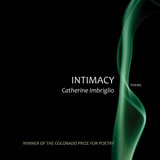
Intimacy is a series of experimental poems that play with, resist, and acknowledge complicity with received concepts of intimacy that circulate in this media-centric age. Undertaking an expansive understanding of the word “intimacy”, each poem contains a word or set of words that modifies the noun, uncovering the attending, associative and often contradictory obligations that arise in our relations with one another.

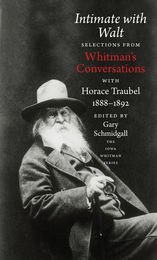
In Intimate with Walt Gary Schmidgall has condensed Traubel's nearly 5,000 pages into one manageable volume featuring the many self-revealing, humorous, nostalgic, and often curmudgeonly words of the Good Gray Poet. The book is divided into five sections, each consisting of several chapters: the first, presenting Walt on himself, his family, and his daily life and visitors at the only home he ever owned; the second, on his artistic credos, the literary life, and a large array of comments on the writing, publication of, and critical reaction to Leaves of Grass; the third, focusing on his friends, admirers, idols, and lovers; the fourth and longest, presenting his no-holds-barred views on a variety of topics, including the American scene, race, religion, music, and even alcohol; and finally, a gathering of passages revealing Whitman's struggles with his infirmities, his poignant final days, and Traubel's observations on Whitman's deathbed scene and burial rites.

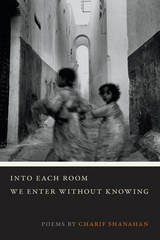
Finalist, Publishing Triangle's Thom Gunn Award
In this affecting poetry debut, Charif Shanahan explores what it means to be fully human in our wounded and divided world. In poised yet unrelenting lyric poems, Shanahan—queer and mixed-race—confronts the challenges of a complex cultural inheritance, informed by colonialism and his mother’s immigration to the United States from Morocco, navigating racial constructs, sexuality, family, and the globe in search of “who we are to each other . . . who we are to ourselves.”
With poems that weave from Marrakesh to Zürich to London, through history to the present day, this book is, on its surface, an uncompromising exploration of identity in personal and collective terms. Yet the collection is, most deeply, about intimacy and love, the inevitability of human separation and the challenge of human connection. Urging us to reexamine our own place in the broader human tapestry, Into Each Room We Enter without Knowing announces the arrival of a powerful and necessary new voice.

Sur’s Ocean: Poems from the Early Tradition was published in 2015 as the fifth volume of the Murty Classical Library of India. That book contains Kenneth Bryant’s critical reconstructions of 433 poems of Surdas that circulated in the sixteenth century, when this great Hindi poet lived, and it includes facing-page, English verse translations by John Stratton Hawley. The name traditionally assigned to these poems is Sursagar, meaning Sur’s Ocean.
Into Sūr’s Ocean: Poetry, Context, and Commentary picks up many threads from that volume, and provides a substantial introduction to the poet, his medium, and his oeuvre; an overview of editions, including Bryant’s; an analysis of the challenges Hawley faced as translator; and poem-by-poem commentary. Each commentary is a brief, independent essay. This book offers a deep—and rewarding—dive into Sur’s Ocean.
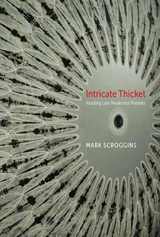
In these essays, Scroggins reviews the legacy of Louis Zukofsky, delineates the exceptional influence of the Black Mountain poets, and provides close readings of a wealth of examples of poetic works from poets who have carried the modernist legacy into contemporary poetry. He traces with an insider’s keen observation the careers of many of the most dynamic, innovative, and celebrated poets of the past half-century, among them Ian Hamilton Finlay, Ronald Johnson, Rae Armantrout, Harryette Mullen, and Anne Carson.
In a concluding pair of essays, Scroggins situates his own practice within the broad currents he has described. He reflects on his own aesthetics as a contemporary poet and, drawing on his extensive study and writing about Louis Zukofsky, examines the practical and theoretical challenges of literary biography.
While the core of these essays is the interpretation of poetry, Scroggins also offers clear aesthetic evaluations of the successes and failures of the poetries he examines. Scroggins engages with complex and challenging works, and yet his highly accessible descriptions and criticisms avoid theoretical entanglements and specialized jargon. Intricate Thicket yields subtle and multifaceted insights to experts and newcomers alike.

This innovative textbook for learning classical Chinese poetry moves beyond the traditional anthology of poems translated into English and instead brings readers—including those with no knowledge of Chinese—as close as possible to the texture of the poems in their original language. The first two chapters introduce the features of classical Chinese that are important for poetry and then survey the formal and rhetorical conventions of classical poetry. The core chapters present the major poets and poems of the Chinese poetic tradition from earliest times to the lyrics of the Song Dynasty (960–1279).
Each chapter begins with an overview of the historical context for the poetry of a particular period and provides a brief biography for each poet. Each of the poems appears in the original Chinese with a word-by-word translation, followed by Fuller’s unadorned translation, and a more polished version by modern translators. A question-based study guide highlights the important issues in reading and understanding each particular text.
Designed for classroom use and for self-study, the textbook’s goal is to help the reader appreciate both the distinctive voices of the major writers in the Chinese poetic tradition and the grand contours of the development of that tradition.
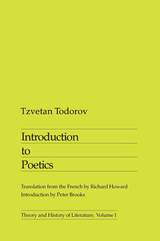

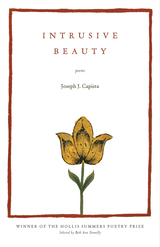
Winner of the 2018 Hollis Summers Poetry Prize
Joseph J. Capista’s Intrusive Beauty reckons with reluctant ecstasy and the improbable forms that beauty assumes. In this powerful debut, Capista traverses earth and ether to yield poems that elucidate the space between one’s life and one’s livelihood. While its landscapes range from back-alley Baltimore to the Bitterroot Valley, this book remains close to unbidden beauty and its capacity to sway one’s vision of the world. Whether a young father who won’t lower the volume on the radio or a Victorian farm boy tasked with scaring birds from seed-sown furrows, the inhabitants of Intrusive Beauty are witness to the startling ease with which one’s assorted lives come in time to comprise a singular life. Mortality, love, duty, desire, an acute longing for transcendence: here, old themes resound anew as they’re uttered in a multiplicity of forms and means, holding fast always to the heart.

Ajuan Maria Mance establishes that the history of African American women's poetry revolves around the struggle of the Black female poet against two marginalizing forces: the widespread association of womanhood with the figure of the middle-class, white female; and the similar association of Blackness with the figure of the African American male. In so doing, she looks closely at the major trends in Black women's poetry during each of four critical moments in African American literary history: the post- Reconstruction era from 1877 to 1910; the Harlem Renaissance of the 1920s; the Black Arts Movement from 1965 to 1975; and the late twentieth century from 1975 to 2000.
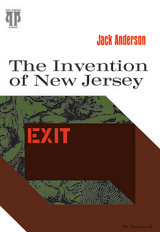
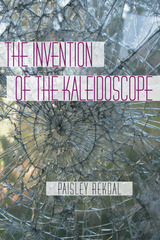
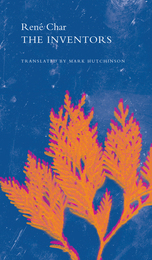
The Inventors includes a brief introduction to Char’s life and work, as well as a series of notes on the backstories of the works, which explain allusions that may not be immediately familiar to the English-speaking reader. These new translations stay true to the originals, while at the same time conveying much of the music and beauty of the French poems.
Praise for René Char
“Char, I believe, is a poet who will tower over twentieth-century French poetry.”—George Steiner

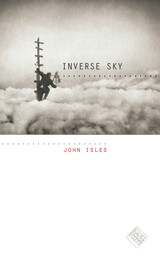
Inverse Sky evokes the paradigm of a shocked and disbelieving child dealing with a broken promise, yet the poems carry within themselves the knowledge that promises will be kept. The only response to broken promises is “to come undone / to come and go in a single breath.” But this is a beginning as well as an end. Each poem becomes a new world—for if there is anything on earth worth loving, it is something made with the world as it has been handed down to us. Inverse Sky is an insistent effort to "love the things not loving back.”
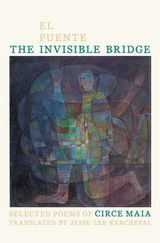
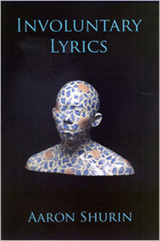
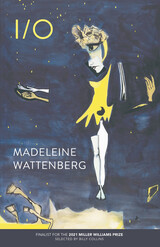
Finalist for the 2021 Miller Williams Poetry Prize.
Madeleine Wattenberg’s debut collection I/O, finalist for the 2021 Miller Williams Poetry Prize, alternates between epistolary poems to the mythical figure Io and lyrical interrogations of science, myth, and the historical record. Wattenberg casts Io—the priestess of Hera who was turned into a heifer—as a woman struggling to navigate the terrain between choice and coercion. Accompanying the letters to Io are poems whose explorations range from laboratories to airships in their pursuit of answers. Here the poetic imagination emerges as its own laboratory, drawing inspiration as much from ancient myth as from science and steampunk as it refuses to be constrained by a final conclusion.
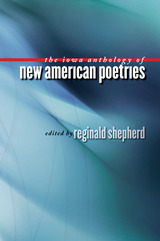
This landmark collection features emerging poets who combine a commitment to innovation and experimentation with a love for the lyric tradition, whose poetry transcends “mainstream” and avant-garde practice to create new and exciting poetic territories.
These new American poetries for the twenty-first century and beyond reach back toward the Modernists and even earlier lyric poetries (such as those of Wyatt, Donne, Keats, and Dickinson) and, simultaneously, reach forward to poetic possibilities not yet realized or even imagined. Most of the poets included here have won publication prizes, awards, and fellowships, and some have had their work anthologized. Others are at earlier stages of recognition but have published in major journals. All are writing highly accomplished work that will soon find a wider audience.
One distinguishing feature of this collection is the inclusion of substantial artistic statements from each contributor, in which the poets discuss their works, their influences, their aims, and their poetics. These statements are invaluable in giving readers a point of entry to the poems and can contribute to the development of a conversation among American poets that transcends questions of “craft” to address fundamental issues of poetry as an artistic practice.
Shepherd, a leading poet, essayist, and literary critic, is uniquely situated to bring us this important collection: young enough to feel the spirit of newer poets and yet established enough to bring a more experienced eye and a wider view to this groundbreaking project.The Iowa Anthology of New American Poetries highlights some of the most exciting, vital, and productive tendencies in contemporary American poetry and will be a significant milestone for students and teachers of poetry as well as for the general reader.
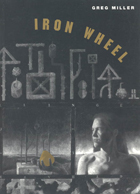

With literature waning in the interest of so many, is Shakespeare the only poet the public can still appreciate? John Milton, as this book makes clear, speaks more powerfully to the eternal questions and to the important concerns of our time. The Milton of this volume is an author for all Americans—conservative, liberal, radical—not only because he was a favorite of the founding fathers, his voice echoing through their texts and our very foundation, but also because his visionary writing embodies the aspirations that have guided Americans seeking ideals of ethical and spiritual perfection.
Nigel Smith makes a compelling case for Milton’s relevance to our present situation. In direct and accessible terms, he shows how the seventeenth-century poet, while working to write the greatest heroic poem in the English language, also managed to theorize about religious, political, and civil liberty in ways that matter as much today as they did in Puritanical times. Through concise chapters that chart Milton’s life at the center of the English and European literary and political scenes—as well as his key themes of free will, freedom and slavery, love and sexual liberty, the meaning of creation, and the nature of knowledge—Smith’s work brings Milton, his poetry, and his prose home to readers of our day. A provocative and enlightening introduction, for newcomers and informed readers alike, this book rediscovers and redefines Milton for a new generation, one that especially needs and deserves to know him.

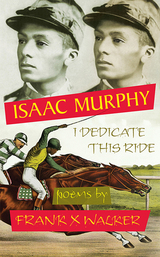
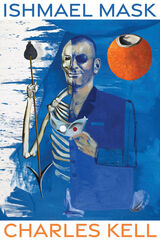
In Ishmael Mask, Charles Kell reminds us that identity is precarious. Kell’s collection is a collage of the journeys and interior lives of various wanderers—from Ishmael, the son of Hagar, to Melville’s Ishmael, and from Pierre of The Ambiguities to Pierre Guyotat. Each poem strips back the mask and beckons us to witness humanity in its barest forms. Captain Ahab’s leg, Ishmael’s arm, and Pierre’s severed head serve as invitations to consider hunger and hope. The inspirations behind these poems—the Bible, Heraclitus, Melville, Guyotat, Tomaž Šalamun—are transformed by Kell, conjuring dreamscapes both dazzling and haunting.
Ishmael Mask masterfully allows a glimpse into the human experience of feeling lost—even when right at home, even in our own bodies.
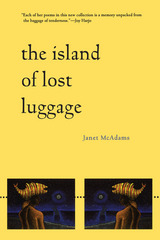
the disappeared, the lost children, the Earharts
of modern life. It's your bad luck to die in the cold
wars of certain nations. But in the line at Unclaimed
Baggage, no one mourns for the sorry world
that sent them here . . ."
The abused. The oppressed. The terrified victims of institutionalized insanity. Making daring connections between the personal and the political, Janet McAdams draws new lines in the conflict between the new and old worlds as she redefines the struggle to remain human.
This award-winning collection of poetry forges surprising links among seemingly unrelated forms of violence and resistance in today's world: war in Central America, abuses against Nature, the battleground of the bedroom. McAdams evokes the absurdity of everyday existence as she sends out a new call for social responsibility.
The Island of Lost Luggage is the poetry winner of the 1999 First Book Awards competition of the Native Writers' Circle of the Americas.

A groundbreaking reassessment of W. H. Auden’s early life and poetry, shedding new light on his artistic development as well as on his shifting beliefs about political belonging in interwar England.
From his first poems in 1922 to the publication of his landmark collection On This Island in the mid-1930s, W. H. Auden wrestled with the meaning of Englishness. His early works are prized for their psychological depth, yet Nicholas Jenkins argues that they are political poems as well, illuminating Auden’s intuitions about a key aspect of modern experience: national identity. Two historical forces, in particular, haunted the poet: the catastrophe of World War I and the subsequent “rediscovery” of England’s rural landscapes by artists and intellectuals.
The Island presents a new picture of Auden, the poet and the man, as he explored a genteel, lyrical form of nationalism during these years. His poems reflect on a world in ruins, while cultivating visions of England as a beautiful—if morally compromised—haven. They also reflect aspects of Auden’s personal search for belonging—from his complex relationship with his father, to his quest for literary mentors, to his negotiation of the codes that structured gay life. Yet as Europe veered toward a second immolation, Auden began to realize that poetic myths centered on English identity held little potential. He left the country in 1936 for what became an almost lifelong expatriation, convinced that his role as the voice of Englishness had become an empty one.
Reexamining one of the twentieth century’s most moving and controversial poets, The Island is a fresh account of his early works and a striking parable about the politics of modernism. Auden’s preoccupations with the vicissitudes of war, the trials of love, and the problems of identity are of their time. Yet they still resonate profoundly today.

The short lyric poems in Larissa Szporluk's new collection, Isolato, search for meaning and beauty—for poetry—in an unpredictable and incomprehensible world. Their voices break from the contemporary preoccupation with autobiography, held together by language rather than a sustained narrative or plot. Yet the narrative fragments clearly evoke certain themes and moods: interaction of and struggle between the human and natural world; violence, particularly against women and children; alienation and betrayal; the mysteries of the universe, God, and death; and, of course, poetry itself.
Variously called a religious, a metaphysical, or a visionary poet, Szporluk has been compared to Emily Dickinson and George Herbert as well as to twentieth-century poets like Sylvia Plath, Mark Strand, and Louise Glück. Her work is concise, experimental, and challenging. Language and syntax are often elusive, the logic that of dreams or music, the imagery mysterious. The poems, once read, are not easily dismissed. Like the poet's “Deer Crossing the Sea,”readers find “the promise of nectar / haunts them forever, the shore pecked out / of their eyes, and there, in its stead, / something greater to catch, / a scent that would paralyze God.”
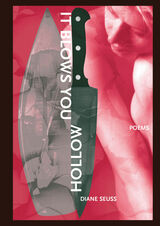
Nothing is solved by the end of this book, but much is gained as the quest itself has become a victory of perfectly pitched and furious language. God’s still hidden away, but by now the natural world has evolved to replace the absence Seuss feels. In the book’s erotically charged universe, one paradoxically begins to feel a calm settle over the burned-up panorama of the soul. It Blows You Hollow is a book, rare these days, that feels as if it had to be written. Diane Seuss goes for broke.
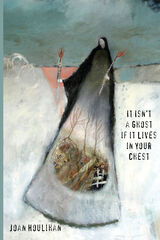
Houlihan’s sixth collection of lyric poems reflects upon the persistence of what is lost and the accidental ruptures of trauma that allow re-entry into our world. These poems are at once despairing and hopeful.
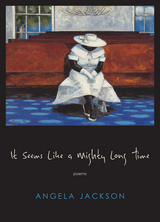
2015 PEN Open Book Award Finalist
Angela Jackson’s latest collection of poetry borrows its title from a lyric in Barbara Lewis’s 1963 hit single “Hello Stranger,” recorded at Chess Records in Chicago. Like the song, Jackson’s poems are a melodic ode to the African American experience, informed by both individual lives and community history, from the arrival of the first African slave in Virginia in 1619 to post-Obama America.
It Seems Like a Mighty Long Time reflects the maturity of Jackson’s poetic vision. The Great Migration, the American South, and Chicago all serve as signposts, but it is the complexity of individual lives—both her own and those who have gone before, walk beside, and come after—that invigorate this collection. Upon surveying so vast a landscape, Jackson finds that sorrow meets delight, and joy lifts up anger and despair. And for all this time, love is the agent, the wise and just rule and guide.
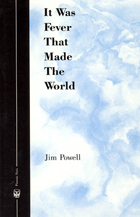
"I find it difficult to overpraise the ease of this writing, which in one act combines succinct physical presentation and explanation of it. . . . It is perhaps here that Jim Powell, not yet forty, most shows his superiority to many of his contemporaries and seniors. He not only understands the way in which opposites are necessary to one another, he achieves his knowledge in the poem, and so we grasp it as we read. . . . he has tapped a subject matter that is endless and important, and by the thoroughgoingness and the subtlety of his exploration shows he has the power to do almost anything."—Thom Gunn, Shelf Life
"His title burns away everywhere in the volume, in the fevers of eros, divination, memory, destruction, and grief. . . . Page for page, there is more sheer fine, clear, yet syntactically subtle and metaphorically gorgeous writing in Powell than I have seen in some time."—Mary Kinzie, Poetry
"Jim Powell's poems, like those of Thomas Hardy, are haunted forms, full of ghosts and mocking gods, shadows and foreshadowings. But Powell is a Hardy whose poems we've never read, a Hardy with his hand in the blaze, not stirring the ash in a cold and wind-torn grate."—Jennifer Clarvoe, The Threepenny Review
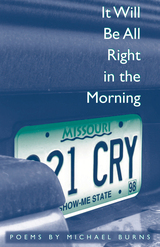
In his plain-spoken lyrics and dramatic monologues, Michael Burns digs at the marrow. His poems—in formal and free verse—are quick, incisive, and always capable of revealing the dark whimsies of fate and the pain of our own actions and inactions.
These poems travel to Casqui mounds in the Arkansas Delta, traffic-clogged urban streets, a wasteland in Oklahoma, and Faulkner’s Rowan Oak. They assume the voices of others so convincingly that we find ourselves face to face with hunters, philanderers, husbands, a Union general, a Snopes, and even a version of God.
Gathering the images of each place, crafting lines in clear, unpretentious language, Burns comes across new knowledge, confronting the ever-present mysteries and the ways the mind loves to lie to itself.
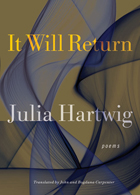
In It Will Return, her most recent volume of poems, Julia Hartwig is in dialogue with other great artists—Keats, Rimbaud, Milosz, Beethoven, Ravel, Van Gogh—considering the implications of greatness. Alongside this expansive perspective, we find attention to the smallest details, composing quotidian moments that open out into unexpected meaning. For Hartwig, close attention to the material world is a kind of spiritual undertaking. Like her Nobel Prize–winning contemporary Wislawa Szymborska, she writes poems that appear simple but are somehow all the more capable of yielding profound insights.
It Will Return reflects Hartwig’s firsthand involvement in Polish history and culture, and its poems are sensitive to the calamities of Poland’s tumultuous twentieth century. But It Will Return is a human collection before it is a national one, and these political motifs form the backdrop for more universal dramas.
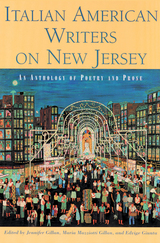
This anthology gathers fiction, poetry, memoirs, oral histories, and journalistic pieces by some of the best writers to chronicle the Italian American experience in the Garden State. These works focus on ethnic identity and the distinctive culture of New Jersey, which has long been home to a large and vital Italian American community.
Filled with passion, humor, and grace, these writings depict a variety of experiences, including poignant but failed attempts at conformity and the alienation often felt by ethnic Americans. The authors also speak of the strength gained through the preservation of their communities and the realization that it is often the appreciation of their heritage that helps them to succeed. Although presented from the vantage point of only one ethnic group, this book addresses in microcosm the complexities of American identity, depicting situations and conveying emotions that will resonate with people of all immigrant ancestries.
Among the many writers featured are Gay Talese, Bill Ervolino, Tom Perrotta, Louise DeSalvo, Carole Mazo, Diane di Prima, and Maria Laurino. Each of the contributors provides a fresh perspective on the diversity, complexity, and richness of the Italian American experience.
Publication of this book is made possible in part by a grant from the Institute of Italian and Italian American Heritage Studies, State of New Jersey.

In her latest work, Rose returns to these major motifs while exploring a new dimension: using poetry as a tool to delve into the buried secrets of family history—and all of American history as well. Confronting questions of personal history that itch like crazy—the irritations that drive human existence—she acknowledges and pays tribute to her Indian and European ancestors without hiding her anger with American society.
Rose's poems are strong political and social statements that have a distinctly narrative flavor. Here are Europeans who first set foot on America's shores while Taino Indians greeted them as if they were visiting neighbors; Hopi and Miwok "Clan Mothers, grand-daughters, all those the missionaries erased"; and European forebears who as settlers pushed their way relentlessly west. Through her vivid imagery, she speaks to and for these ancestors with a sense of loss and an itching caused by the biases provoked by ethnic chauvinism.
Itch Like Crazy is a finely crafted literary work that is also a manifesto addressing contacts and conflicts in the history of Indian-white relations. By presenting another view of U.S. history and its impact on the Native Americans who are her ancestors, it offers a new appreciation of the issue of "tribal identity" that too often faces Native peoples of the Americas—and is too often misunderstood by Euro-American society.


The Tria sunt, named for its opening words, was a widely used and highly ambitious book composed in England in the late fourteenth century during a revival of interest in the art of poetry and prose.
The backbone of this comprehensive guide to writing Latin texts is the wealth of illustrative and instructive sources compiled, including examples from classical authors such as Cicero and Horace as well as from medieval literature, and excerpts from other treatises of the same period by authors from Matthew of Vendôme through Gervase of Melkley. Topics treated at length include methods for beginning and ending a composition, techniques for expanding and abbreviating a text, varieties of figurative language, attributes of persons and actions, and the art of letter writing.
This anonymous treatise, related especially closely to work by Geoffrey of Vinsauf, served as a textbook for rhetorical composition at Oxford. Of all the major Latin arts of poetry and prose, it is the only one not previously edited or translated into English.
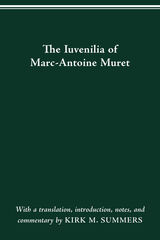
A growing interest in the contributions and perspectives of Renaissance authors who wrote in Latin has created an urgent need for accessible modern editions of their works. There is no hope of truly understanding the Renaissance, which, after all, was a revival of ancient learning integrated with an emerging modern world view, without taking into account the large body of work produced by neo-Latin authors. The Iuvenilia of Marc-Antoine Muret helps fill the need for critical editions that provide a general context and interpretation. A major neo-Latin poet, Muret was thoroughly versed in classical literature, mythology, rhetoric, and philosophy. He had inherited centuries of medieval learning and practices, both secular and religious. Muret incorporated the generic innovations of contemporary humanists while referring to current events and figures. In short, he summed up in his own person the body of human endeavor and thinking as it stood in his own time.
Given Muret’s importance, this lively translation by Kirk M. Summers, with an introduction, notes, and commentary, will appeal to classicists, including those interested in the classical tradition, as well as to scholars working on the French and European Renaissance.
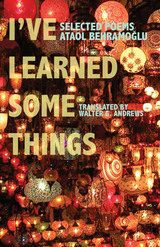
I've Learned Some Things allows English-language readers the rare opportunity to experience the work of Ataol Behramoğlu, one of Turkey's most celebrated poets. The sixty-six poems in this collection span the author's extraordinary career and are stunning examples of the intense emotional quality of his work. Behramoğlu celebrates the rich fabric of everyday life by exploring both personal and social struggles, sometimes employing a whimsical tone.
Walter G. Andrews's skillful translation conveys the vibrancy of Behramoğlu's work to an English-language audience, and this bilingual edition allows Turkish-language readers to follow the original text.
READERS
Browse our collection.
PUBLISHERS
See BiblioVault's publisher services.
STUDENT SERVICES
Files for college accessibility offices.
UChicago Accessibility Resources
home | accessibility | search | about | contact us
BiblioVault ® 2001 - 2024
The University of Chicago Press









